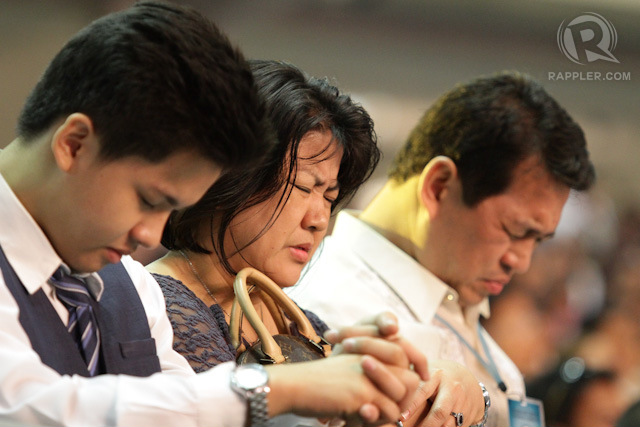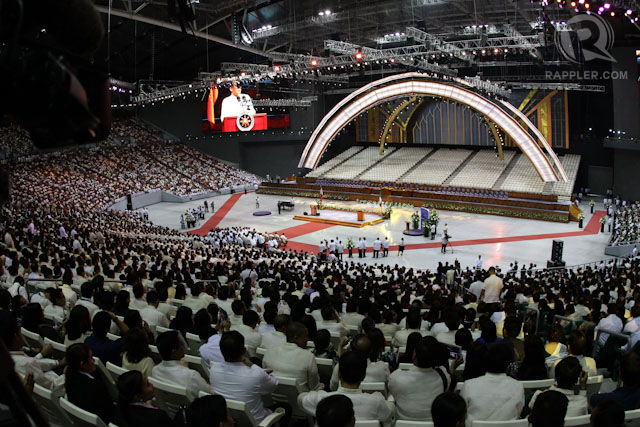SUMMARY
This is AI generated summarization, which may have errors. For context, always refer to the full article.

BULACAN, Philippines – “Opo… opo… opo…” (Yes… yes… yes…)
For almost every sentence by the Iglesia ni Cristo (INC) minister leading a prayer onstage, the 55,000 INC members in the Philippine Arena responded with a loud “opo,” the Filipino word for “yes” in addressing the elderly or people in authority.
Mostly dressed in white, members closed their eyes and even cried. It was less than a week before marking on Sunday, July 27, the 100th anniversary of the INC, the Church of Christ, a group that has grown to 2.25 million followers from only a dozen when it was born in the Philippines in 1914. (READ: Aquino, 50k INC members in ‘largest theater on Earth’)
Their closing prayer for the pre-centennial event at the Philippine Arena on Monday, July 21, showed the type of obedience the INC is known for.
This culture of “opo” – a total, unquestioning “yes” to the Lord through INC ministers – pervades and strengthens the INC even beyond their grandiose temples.
In an interview with Rappler, Bro Edwil Zabala, an INC spokesman, explained that obedience lies at the core of their Christian church.
Sociologist Jayeel Cornelio, who specializes in religion, also told Rappler that the success of the INC partly “lies in its strictness.” Cornelio added, “In the sociology of religion, stricter religions are stronger.”
‘Even against personal wishes’

Filipinos have known the INC for its strictness since its founder, Felix Manalo, registered the group with the Philippine government on July 27, 1914.
The INC bans marrying non-INC members, gambling, and excessive drinking, among other things. It requires members to vote only the politicians whom their leaders endorse. It is also commonly known to oblige tithing – or donating 10% of one’s income to the INC – but the INC itself denies this. (READ: Faith in action: The practices of Iglesia ni Cristo)
Ka Dory, a 44-year-old INC member from Montalban, Rizal, told Rappler that strictness lures believers to the Iglesia. (READ: The lure of Iglesia: Recruitment and the perks)
“Kung hindi tayo babawalan, tuluy-tuloy na nakakagawa tayo ng kasalanan. Sa Iglesia talaga, halos lahat na lang ng pagbabawal na puwede i-apply ay gagawin para mapanuto po ang pamumuhay,” Ka Dory said. (If there are no prohibitions, we continually commit sin. In Iglesia, almost all prohibitions that can be applied are applied so that one’s way of life does not go wayward.)
Zabala, for his part, stressed that obedience is “very important” in the INC, “even if it goes against your personal wishes.”
“That is the point, that is the position of the Iglesia ni Cristo. That even if you get hurt, this is what the Bible teaches. This is the requirement of Christ,” he said in Filipino.
Zabala clarified that this doesn’t obscure free will – which enters the picture from the very beginning. He said members used their free will, in the first place, when they chose to join the INC.
For one, unlike in the Catholic Church, INC members don’t receive baptism as babies. They “still have to go through the Bible study and doctrines” even if their parents already belonged to the INC.
Zabala said it takes at least 6 months before anyone can accept baptism in the INC “so that you can exercise your free will” and examine the INC’s teachings “in light of what the Bible teaches.”
“At the end of that time, if you get convinced, then you’ll have to follow,” Zabala said.
When members invest ‘a lot more’

Cornelio partly credited this “strictness” for the INC’s success, because entering a strict religion “demands more from you.” He continued, “And what does that mean? You’re investing a lot more.”
Cornelio, a postdoctoral research fellow at the Max Planck Institute for the Study of Religious and Ethnic Diversity from 2012 to 2014, contrasted the INC with the “very relaxed” Catholic Church.
He said: “For many people, being part of an organized structure with strict tenets can be appealing. Why? Because it demonstrates discipline.”
Cornelio’s claim finds basis in a frequently quoted paper in the American Journal of Sociology – “Why Strict Churches Are Strong” by Santa Clara University’s Laurence Iannaccone in 1994.
In this paper, Iannacone argued “that strict demands ‘strengthen’ a church in 3 ways: they raise overall levels of commitment, they increase average rates of participation, and they enhance the net benefits of membership.”
Strict demands also discourage “free riders,” the author added.
Citing survey data, Iannacone explained: “Members of stricter denominations devote more time and money to their religions and are more likely to describe themselves as strong members of their faith. They socialize more extensively with fellow members and are less involved in secular organizations.”
‘They have arrived’

To be sure, other factors have led to the INC’s rise.
Zabala said the key to the INC’s success is “simple” – faithfulness to the Bible.
He said INC ministers often challenge non-INC members to compare their churches’ teachings with “what the Bible teaches.”
If a non-INC member finds “even just one contradiction,” INC ministers ask: “Why would you choose to remain in a church that claims to follow the Lord God and follow the Lord Jesus Christ, but contradicts one or more teachings recorded in the Bible?”
Cornelio listed other factors that led to the INC’s success:
- The “convincing dimension or character” of the INC’s doctrine, along with the idea that “they are the chosen people and the one true church”
- The charisma of their founder, Felix Manalo, and his two successors
- The INC’s “very Filipino” character, from its use of the Filipino language to the claim that the final prophet will come from the East, as prophesied in the Bible, in the form of a Filipino
These factors make Cornelio believe that the INC, which has spread to more than 100 countries, will grow “much stronger” in the next 100 years. (READ: Philippine Arena shows INC’s ‘global’ stature)
“It has already shed its identity of being a cult or sect,” Cornelio said.
Cornelio also said: “When we were growing up, Iglesia ni Cristo was, ‘Ay, kulto ‘yan!’ (That’s a cult!) But now, can we still talk about Iglesia ni Cristo as a cult? Sociologically it is a sect. But in terms of popular discourse, maybe not anymore. Why? Because they have arrived – not just in the Philippine scene, but in the global scene.” – Rappler.com
Add a comment
How does this make you feel?
There are no comments yet. Add your comment to start the conversation.